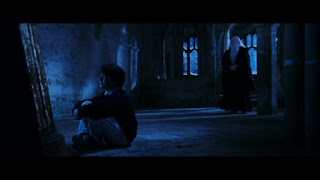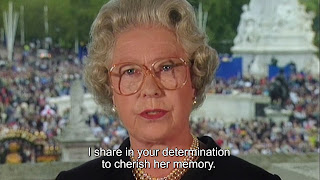Today is Halloween, a holiday I never much cared for growing up except for the extra candy it brought. But for Harry Potter fans, October 31 carries a deeper meaning: it marks the night in 1981 when Lord Voldemort killed Harry’s parents, setting the story in motion. On this anniversary, I want to share my journey through the films, a journey I began seventeen days ago when curiosity finally drew me into this world.
After hesitating for years, I decided to watch all eight films, two per Saturday night, finishing just in time for Halloween. These are not professional critiques, but personal reflections: what I liked, what spoke to me, and what I learned.
Harry Potter and the Sorcerer's Stone (2001)
When I first saw it years ago, I dismissed it. This time, I found it a warm introduction, safe and inviting, almost like a bedtime story. The scene that struck me most was Harry before the Mirror of Erised, longing to see his parents. Dumbledore’s words, “It does not do to dwell on dreams and forget to live,” cut deep.
The scene that spoke to me the most was when Harry found the mirror of Erised and came back to gaze longingly at the reflection where his parents were in. Dumbledore soon appeared far behind him.
Dumbledore: Back again, Harry?
Harry turns around and stands up.
Dumbledore: I see that you, like so many before you, have discovered the delights of the Mirror of Erised. I trust by now you realize what it does. Let me give you a clue. The happiest man on earth would look into the mirror and see only himself, exactly as he is.
Harry: So, then it shows us what we want? Whatever we want?
Dumbledore: Yes...and no. It shows us nothing more or less than the deepest, most desperate desires of our hearts. Now you, who have never known your family, you see them standing beside you. But remember this, Harry. This mirror gives us neither knowledge nor truth. Men have wasted away in front of it, even gone mad. That is why tomorrow it will be moved to a new home, and I must ask you not to go looking for it again. It does not do to dwell on dreams, Harry, and forget to live.
If I stood before that mirror, I would likely cry. It would reveal my own deepest desires, my own sense of incompleteness. The lesson was clear: I must not lose myself in longing for a life I cannot reclaim. I must live in the present and cherish what I still have.
Harry Potter and the Chamber of Secrets (2002)
Richard Harris’s gentle, wise Dumbledore stood out most, soft spoken yet commanding respect.
The lesson came instead from Gilderoy Lockhart, the fraudulent professor obsessed with fame.
Watching him reminded me of my own conceit in my twenties, when I craved recognition without working hard enough to deserve it. Lockhart’s downfall became a mirror, showing me the cost of ego.
Harry Potter and the Prisoner of Azkaban (2004)
This film raised the stakes. Darker, more complex, beautifully shot, it made Hogwarts feel less like a wonderland and more like a real, perilous world. The introduction of dementors and Sirius Black deepened the story.
Here, Dumbledore was portrayed by Michael Gambon after Richard Harris’s passing.
Some prefer one interpretation over the other, but I accepted the change. To me, each brought something meaningful.
Harry Potter and the Goblet of Fire (2005)
This was my least favorite. It felt rushed, crammed with too much story and not enough time to breathe. A longer runtime, like The Lord of the Rings: Return of the King, could have done it justice. Still, it served its purpose, pushing the story into darker waters.
Harry Potter and the Order of the Phoenix (2007)
Here the story regained strength. Dolores Umbridge, brilliantly portrayed by Imelda Staunton, embodied cruelty masked as order. Harry’s decision to secretly teach his peers inspired me to ask: would I have had the courage to resist unjust authority, or would fear have made me conform?
I hope I would stand with Harry, though I know my own caution. The lesson here was that true leadership demands principle, even at risk. On a lighter note, Staunton’s performance convinced me she will shine as Queen Elizabeth II in The Crown.
Harry Potter and the Half-Blood Prince (2009)
This film felt like a bridge to the finale. I wished it had been split in two, with more room to explore Voldemort’s origins. Still, one small scene with Professor Slughorn stayed with me.
“You recognize Barnabas Cuffe, editor of the Daily Prophet. Always takes my owls, should I wish to register an opinion on the news of the day.”
Slughorn then points to another photo.
“Gwenog Jones, captain of the Hollyhead Harpies. Free
tickets whenever I want them. Of course, I haven't been to a match in some
time.”
Proud of his connections, he displayed photos of “famous friends,” hoping to collect Harry as a trophy. His vanity mirrored my own past obsession with proximity to fame, my photos with dignitaries, my hunger for recognition. That scene reminded me to seek worth not in association but in humility and true friendship.
A somber film, slower in pace, but necessary as preparation for the end. The characters, and the audience, had grown up. Darkness pressed in on all sides.
Harry Potter and the Deathly Hallows – Part 2 (2011)
Having completed all eight films, I can say I liked the saga, though I did not fall in love with it. It was too late in life for me to feel the formative magic others experienced growing up with Harry. Still, the films gave me lessons through their characters: Lockhart and Slughorn urging humility, Dumbledore teaching the balance between longing and living, Harry showing the strength of principle.
I may revisit the series again, perhaps next Halloween. I will not collect wands or Hogwarts dioramas, but if someone offers me the books, I will gladly accept.
A friend once wrote, “Hey, maybe you’ll fall in love with Harry Potter, and you and I could travel to Universal together and go to Hogwarts.” I would gladly go with her. To ride the Hogwarts Express, even as adults, would feel like stepping into that longed-for place we can never truly reach, yet always carry in our hearts.






















%20s-l1600%20(1).jpg)
%20s-l1600%20(2).jpg)
.jpg)
























